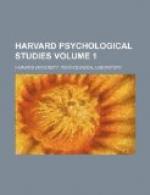* * * * *
HABIT FORMATION IN THE CRAWFISH CAMBARUS AFFINIS.[1]
BY ROBERT M. YERKES AND GURRY E. HUGGINS.
[1] See also Yerkes, Robert:
’Habit-Formation in the Green
Crab, Carcinus Granulalus,’
Biological Bulletin, Vol. III.,
1902, pp. 241-244.
This paper is an account of some experiments made for the purpose of testing the ability of the crawfish to profit by experience. It is well known that most vertebrates are able to learn, but of the invertebrates there are several classes which have not as yet been tested.
The only experimental study of habit formation in a crustacean which we have found is that of Albrecht Bethe[2] on the crab, Carcinus maenas. In his excellent paper on the structure of the nervous system of Carcinus Bethe calls attention to a few experiments which he made to determine, as he puts it, whether the crab possesses psychic processes. The following are the observations made by him. Experiment I. A crab was placed in a basin which contained in its darkest corner an Eledone (a Cephalopod). The crab at once moved into the dark region because of its instinct to hide, and was seized by the Eledone and drawn under its mantle. The experimenter then quickly freed the crab from its enemy and returned it to the other end of the basin. But again the crab returned to the dark and was seized. This was repeated with one animal five times and with another six times without the least evidence that the crabs profited by their experiences with the Eledone. Experiment 2. Crabs in an aquarium were baited with meat. The experimenter held his hand above the food and each time the hungry crab seized it he caught the animal and maltreated it, thus trying to teach the crabs that meat meant danger. But as in the previous experiment several repetitions of the experience failed to teach the crabs that the hand should be avoided. From these observations Bethe concludes that Carcinus has no ‘psychic qualities’ (i.e., is unable to profit by experience), but is a reflex machine.
[2] Bethe, Albrecht: ’Das
Centralnervensystem von Carcinus
maenas,’ II. Theil.,
Arch. f. mikr. Anat., Bd. 51, 1898, S.
447.
Bethe’s first test is unsatisfactory because the crabs have a strong tendency to hide from the experimenter in the darkest corner. Hence, if an association was formed, there would necessarily be a conflict of impulses, and the region in which the animal would remain would depend upon the relative strengths of its fear of the experimenter and of the Eledone. This objection is not so weighty, however, as is that which must obviously be made to the number of observations upon which the conclusions are based. Five or even twenty-five repetitions of such an experiment would be an inadequate basis




